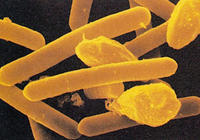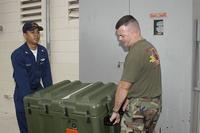-
Physicians feared terrorists might hack Dick Cheney’s cardiac defibrillator

In a 60 Minutes segment aired yesterday (Sunday), former vice-president Dick Cheney told the interviewer that his doctors turned off the wireless function of his implanted cardiac defibrillator (ICD) “in case a terrorist tried to send his heart a fatal shock.” Asked about the concern of Cheney’s physicians, electrophysiologists — these are the cardiologists who implant ICDs – say that as far as they know, this has never happened in the real world but that it is impossible to rule out the possibility.
-
-
Iraqi war- and occupation-related death toll estimated at half a million
A scientific study calculating Iraqi deaths for almost the complete period of the U.S.-led war and subsequent occupation estimates, with 95 percent of statistical certainty, that the total excess Iraqi deaths attributable to the war through mid-2011 to be about 405,000 (“excess” death means death not related to natural causes or causes other than the war and occupation). The researchers also estimated that an additional 56,000 deaths were not counted due to migration. Including this number, their final estimate is that close to half a million people died in Iraq as a result of the war and subsequent occupation from March 2003 to June 2011.
-
-
Innovative salmonella sensing system
Foodborne illnesses making one in six Americans — or forty-eight million people — sick each year. Of these people sickened, 128,000 end up in the hospital, according to the Centers for Disease Control and Prevention, while 3,000 die. A new approach to detecting food contamination enables real-time testing of food and processing plant equipment.
-
-
One in 2,000 people in the U.K. carry mad cow disease proteins

Variant Creutzfeldt-Jakob disease (vCJD) is a degenerative brain disease — often called the human form of bovine spongiform encephalopathy (BSE) or “mad cow disease.” It emerged after widespread exposure to BSE prions in the late 1980s and early 1990s through contaminated meat products in the food chain. Around one in 2,000 people in the United Kingdom may carry variant CJD proteins, concludes a large scale survey published on BMJ.
-
-
Compound derived from vegetables offers shield from lethal radiation doses

Researchers say a compound derived from cruciferous vegetable such as cabbage, cauliflower, and broccoli protected rats and mice from lethal doses of radiation. The compound, known as DIM could protect normal tissues in patients receiving radiation therapy for cancer, but could also protect individuals from the lethal consequences of a nuclear disaster.
-
-
Innovative device speeds up food-pathogen detection
Researchers have developed a system that concentrates foodborne salmonella and other pathogens faster than conventional methods by using hollow thread-like fibers that filter out the cells, representing a potential new tool for speedier detection. The machine, called a continuous cell concentration device, could make it possible to routinely analyze food or water samples to screen for pathogens within a single work shift at food processing plants.
-
-
ASCB: U.S. scientific research will "pay dearly" for shutdown
The American Society for Cell Biology (ASCB) added its voice to those of other scientific and professional groups in warning that the federal government’s partial shutdown will hurt patients, researchers, and especially the U.S. research effort, long after an agreement to end the impasse is reached. “As America keeps hitting the brakes on scientific research, we are, in effect, accelerating the damage done to our continued leadership in global bioscience, in health outcomes and in the economic power that we have always derived from basic research,” Dr. Bertuzzi, executive director of the ASCB said. “Americans will pay dearly for these slowdowns, sequestrations, and shutdowns in finding cures and on maintaining economic competitiveness.”
-
-
Compact, high-power terahertz source at room temperature developed

Terahertz (THz) radiation — radiation in the wavelength range of 30 to 300 microns — is gaining attention due to its applications in security screening, medical and industrial imaging, agricultural inspection, astronomical research, and other areas. Traditional methods of generating terahertz radiation usually involve large and expensive instruments, some of which also require cryogenic cooling. Researchers have developed a compact, room-temperature terahertz source with an output power of 215 microwatts.
-
-
Discovery points way to treatment of lethal toxin botulism

Botulinum neurotoxins are produced by Clostridium botulinum and cause the possibly fatal disease botulism, which impedes nerve cells’ ability to communicate with muscles and can lead to paralysis and respiratory failure. The botulinum toxin has also been identified as a potential biological weapon against a civilian population. Scientists have decoded a key molecular gateway for the toxin that causes botulism, pointing the way to treatments that can keep the food-borne poison out of the bloodstream.
-
-
ACS: Shutdown undermines U.S. innovation, competitiveness, critical services
American Chemical Society (ACS) president Marinda Li Wu said that the budget impasse is effectively choking America’s science innovation pipeline, strangling new discoveries, future economic growth, and job creation. “[T]o shut down a critical part of our nation’s research and innovation pipeline puts our nation at a severe competitive disadvantage globally,” said Wu. “A government shutdown that closes the world’s largest research system can lead to unintended negative consequences putting at peril America’s economic growth and long-term stability.”
-
-
Shutdown paralyzes U.S. food safety regime
Food safety experts this week said that the government shutdown is putting Americans at risk, as the shutdown caused all inspections of domestic food, except meat and poultry, to be halted. The shutdown comes on top of earlier budget cuts to food safety-related agencies, cuts which have already made the food safety inspection regime weaker, so that the shutdown, in the words of one knowledgeable observer, is “creating the potential for a real public health crisis.”
-
-
Drug-resistant Salmonella outbreak in seven states
The Centers for Disease Control and Prevention (CDC) said that seven strains of Salmonella Heidelberg bacteria have been identified as being linked to an outbreak in seven states. The outbreak, associated with Foster Farm chicken product, has so far sickened 278 people. The outbreak strains of Salmonella Heidelberg are resistant to several commonly prescribed antibiotics. The CDC unit tracking disease outbreaks has been working with less than half its personnel since the government shutdown began, and had had to call back thirty furloughed inspectors.
-
-
Dog's mood offers insight into owner’s wellbeing

Researchers are using movement sensors to track normal dog behavior while the animals are both home alone and out-and-about. Providing a unique insight into the secret life of man’s best friend, the sensors show not only when the dog is on the move, but also how much he is barking, sitting, digging, and other key canine behaviors.
-
-
New view of dengue fever

Dengue fever is a mosquito-borne illness that infects at least fifty million people worldwide each year. This infectious tropical disease is found in more than 100 countries, and it has no cure and no vaccine. One reason why it has been difficult to develop new drugs for dengue fever is that there are no good animal models of the disease, which only infects humans. Researchers have now produced a “humanized mouse” that mimics many features of the human immune system. These mice with human immune cells help researchers discover how the mosquito-borne virus depletes blood platelets.
-
-
Helping farmers plow through new, complex food safety regulations
The recently passed Food Safety Modernization Act set safety standards on how farmers grow, harvest, and handle fresh produce to reduce the risk of foodborne diseases. The new regulations to minimize food safety risk include testing for water safety and better managing manure storage. Agricultural extension educators should take a flexible approach in teaching farmers about the changing landscape of food safety regulations, researchers say.
-
More headlines
The long view
We Ran the C.D.C.: Kennedy Is Endangering Every American’s Health
Nine former leaders of the Centers for Disease Control and Prevention (CDC), who served as directors or acting directors under Republican and Democratic administrations, serving under presidents from Jimmy Carter to Donald Trrump, argue that HHS Secretary Roert F. Kennedy Jr. poses a clear and present danger to the health of Americans. He has placed anti-vaxxers and conspiracy theorists at top HHS positions, and he appears to be guided by a hostility to science and a belief in bizarre, unscientific approaches to public health.
